Department of Care Worker
Care WorkerWhat is the job of a Care worker?
Care work ranges from assistance with meals, bathing, excretion, etc. to emotional care.
Caring and supporting work for the elderly and people with disabilities.
Learning in the Department of Care Worker
 We focus on rehabilitative care and nurturing care professionals who can bring smiles to people's lives, from daily life support to emotional care.
We focus on rehabilitative care and nurturing care professionals who can bring smiles to people's lives, from daily life support to emotional care.
Nursing care ranges from assisting with things like eating, bathing and toileting to providing emotional care. It is extremely important for nursing care professionals not only to have extensive knowledge and skills but also to be considerate and understanding of the emotions of others. In addition to basic education, our faculty focuses on understanding "heart" through a variety of practical experiences and training. We train caring professionals who can bring smiles and excitement to people's lives.
Department overview
Qualifications that can be obtained in the Department of Care Worker
Qualified to take the national exam.
After you graduate and gain 5 years of practical experience as a care worker, you will be eligible to take the “Care Manager” exam.
*However, for those who graduated from training facilities between 2017 and 2027, care worker qualifications will be granted provisionally for 5 years after graduation.
Certified Specialist by the Minister of Education, Culture, Sports, Science and Technology
- Welfare living environment coordinator
- Recreation instructor
Flow from admission to employment
Unique point of Ahru
-
Point 01
Through a variety of practical experiences, you will acquire knowledge and skills that will be useful in a variety of nursing care settings.
To accommodate the diversification of facilities and be able to play an active role in any workplace, students will be trained in cooking and how to take care of daily life, and also aim to develop develop students into care managers and facility directors. We encourage students to develop through a variety of opportunities, including improving their presentation skills through research presentations.
-
Point 02
In addition to giving students internships according to a predetermined program, our school also pays great attention to practical experiences at care facilities.
In addition to allowing students to practice skills at elderly health care facilities specified in the school's course, we also organize exchange sessions at facilities supporting people with disabilities and other care facilities through conversations with people using services at these facilities. Thereby helping students understand the unique characteristics of each facilities as a foundation for choosing a future career.
-
Point 03
Students will also learn rehabilitation care skills.
Previously, rehabilitation was only performed through physical therapists, but in the future this field is expected to be part of the Care work major. Therefore, our school has included this subject in the curriculum, combining theory and practice to help students grasp knowledge more effectively.
Class introduction
-
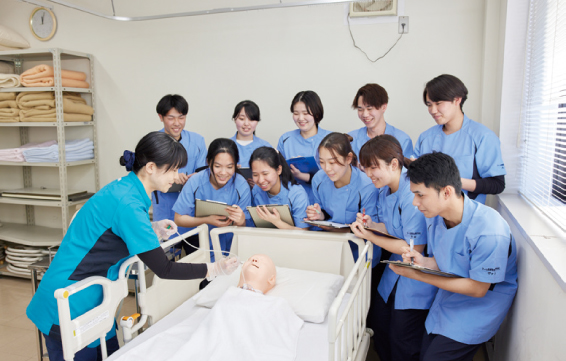
Medical care lecture
As it has become possible for care workers to perform tasks such as sputum suction on-site, medical care has become a required subject at educational institutions. At our school, we use the best equipment available to help you acquire skills while experiencing situations similar to those found in the field.
-
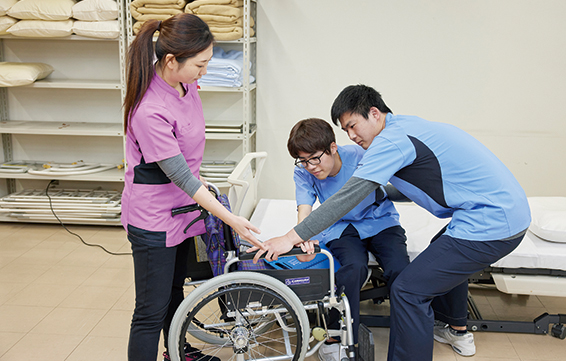
Nursing care comprehensive exercise
In order to utilize it in nursing care training, students will integrate various knowledge and skills required in nursing care settings and gain hands-on experience. At the same time, they will develop their views on nursing care as a profession.
-
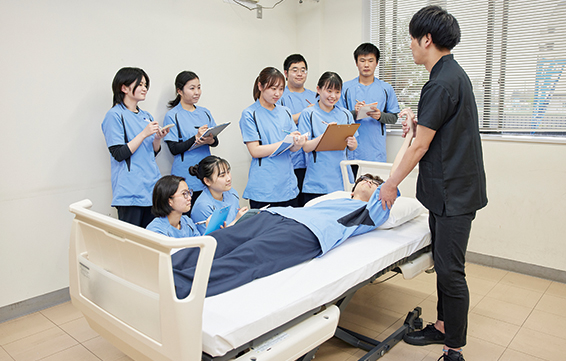
Rehabilitation care
Our school, which has a physical and occupational therapy department, has an environment where you can learn about rehabilitation, which is attracting attention as a part of nursing care. From the faculty of the Department of Physical Therapy, you will learn efficient trance techniques based on physical therapy.
-
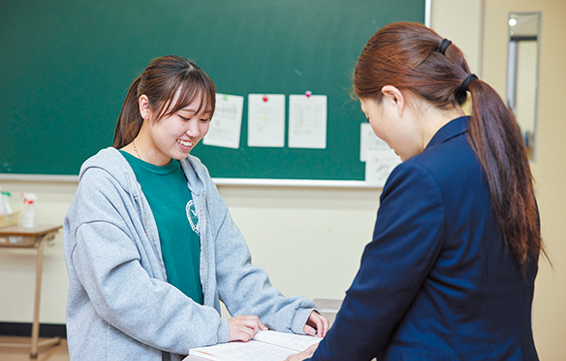
National exam preparation
In preparation for the national exam to be held at the end of January, we will not only measure your progress by conducting regular mock exams, but also share the trends in questions from previous years and things to keep in mind when solving them.
-
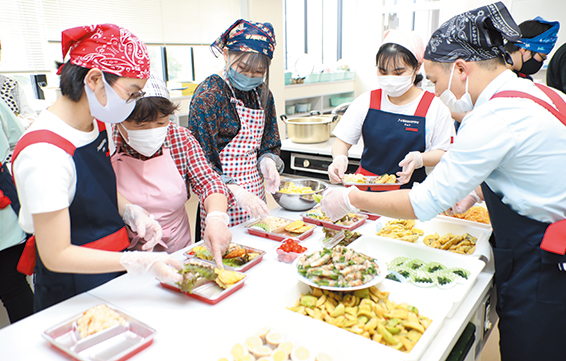
Cooking practice
In order to provide nutritional support to users of home-visit nursing care services, students will learn about ingredients familiar to the elderly and nutritional balance, as well as acquire cooking skills.
-
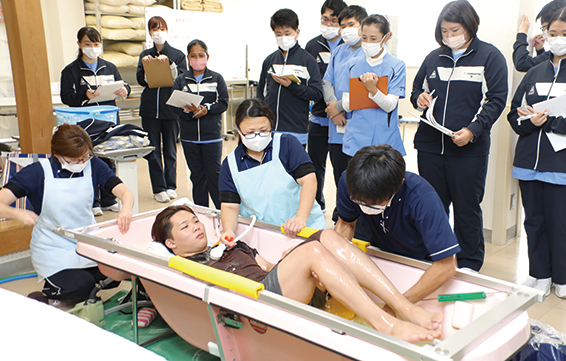
Bathing training
For people who are bedridden and have difficulty taking a bath on their own, we have a visiting bathing service that supports safe bathing using a special bathtub. We will learn how to help our users have a comfortable time.
2 years of Department of Care Worker
Nursing care training
-
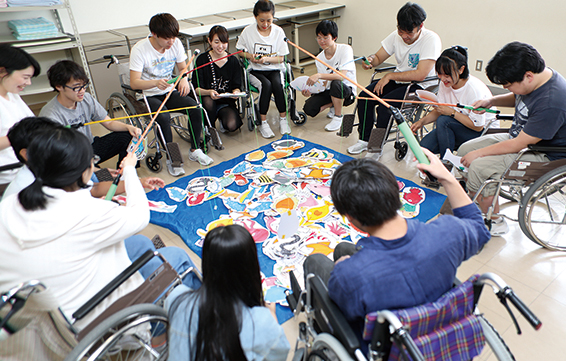
Nursing care training I
The purpose of this training is to learn about the overall flow of work within the facility, as well as for trainees to broadly understand the lives of users and practice nursing care. Through human interaction with the elderly and people with disabilities, you can learn about their needs and specific care methods. In addition, by learning the general roles of facility staff, students will learn daily life support. Here, by putting into practice recreations that we have created ourselves, we will learn about enjoyment in daily life and about recreation and rehabilitation.
-
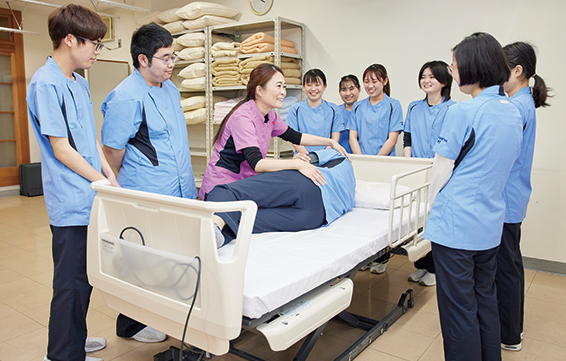
Nursing care training II
This training aims to develop the care process according to the situation and degree of each elderly person or person with a disability. Participants participate in facility management programs (including night shifts) to gain an understanding of services in general, while acquiring the ability to provide care as a member of a team, and put into practice how each user can live the life they desire.
Curriculum
The school organizes classes aimed at improving the quality of human resources, based on the diversification of nursing care needs in recent years. Subjects such as “People and Society” help cultivate knowledge as a foundation for nursing care practice; “Mechanisms of Mind and Body” teaches about interpersonal support and collaboration with other professions; The subject “Nursing Care” includes nursing care techniques. Expect students to gain a lot of knowledge and skills in the two fields plus medical care and become employees who can work immediately.
Please scroll horizontally to view.
| 1st year timetable example | MON | TUE | WED | THU | FRI |
|---|---|---|---|---|---|
| 1st class 9:40~11:10 |
Basics of nursing care | Mechanisms of Mind and Body | Respect for humans and independence | Relationships and communication | Computer exercises |
| 2nd class 11:20~12:50 |
Communication technology | Nursing care comprehensive exercise | Understanding of disability | Mechanisms of Mind and Body | Understanding of dementia |
| 12:50~13:50 | Lunch Time | ||||
| 3rd class 13:50~15:20 |
Sociology | Business manner | Life support technology | Cooking pratice | Understanding development and aging |
| 4th class 15:30~17:00 |
Computer exercises | Understanding of society | Club activities | Nursing care comprehensive exercise | Basics of nursing care |


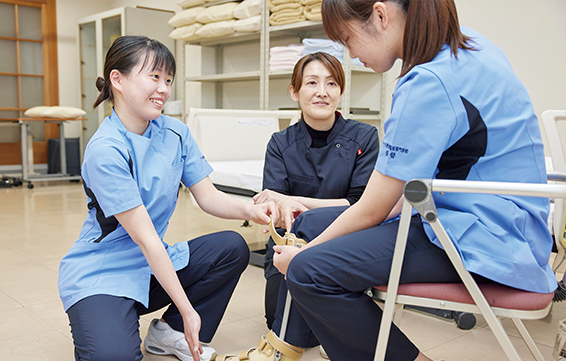


Head of Department of Care Worker
Teacher Mieko Hayakawa
Aiming to pass the national exam and train human resources to meet social needs.
We not only train Japanese students but also international students to become certified care workers as highly specialized human resources.The national exam pass rate continues to be high.
In addition to learning knowledge, students also participate in school activities, through which they are nurtured in etiquette and soft skills.
In addition, the school receives high praise from inside and outside the province for its ability to train human resources who can play leadership roles in nursing care facilities and medical facilities.